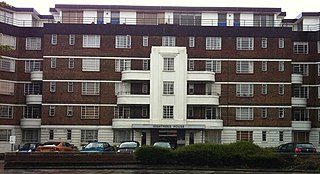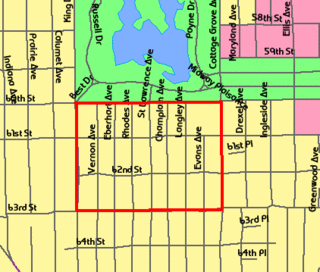Related Research Articles
In economics, an absentee landlord is a person who owns and rents out a profit-earning property, but does not live within the property's local economic region. The term "absentee ownership" was popularised by economist Thorstein Veblen's 1923 book of the same name, Absentee Ownership.

A landlord is the owner of a house, apartment, condominium, land, or real estate which is rented or leased to an individual or business, who is called a tenant. When a juristic person is in this position, the term landlord is used. Other terms include lessor and owner. The term landlady may be used for the female owners. The manager of a pub in the United Kingdom, strictly speaking a licensed victualler, is referred to as the landlord/landlady.
The legal term apportionment means distribution or allotment in proper shares.

A lease is a contractual arrangement calling for the user to pay the owner for use of an asset. Property, buildings and vehicles are common assets that are leased. Industrial or business equipment is also leased. Broadly put, a lease agreement is a contract between two parties: the lessor and the lessee. The lessor is the legal owner of the asset, while the lessee obtains the right to use the asset in return for regular rental payments. The lessee also agrees to abide by various conditions regarding their use of the property or equipment. For example, a person leasing a car may agree to the condition that the car will only be used for personal use.

Central London Property Trust Ltd v High Trees House Ltd [1947] KB 130 is a famous English contract law decision in the High Court. It reaffirmed and extended the doctrine of promissory estoppel in contract law in England and Wales. However, the most significant part of the judgment is obiter dicta as it relates to hypothetical facts; that is, the landlord did not seek repayment of the full wartime rent.
Usufruct is a limited real right found in civil-law and mixed jurisdictions that unites the two property interests of usus and fructus:
As a legal term, ground rent specifically refers to regular payments made by a holder of a leasehold property to the freeholder or a superior leaseholder, as required under a lease. In this sense, a ground rent is created when a freehold piece of land is sold on a long lease or leases. The ground rent provides an income for the landowner. In economics, ground rent is a form of economic rent meaning all value accruing to titleholders as a result of the exclusive ownership of title privilege to location.
A rental agreement is a contract of rental, usually written, between the owner of a property and a renter who desires to have temporary possession of the property; it is distinguished from a lease, which is more typically for a fixed term. As a minimum, the agreement identifies the parties, the property, the term of the rental, and the amount of rent for the term. The owner of the property may be referred to as the lessor and the renter as the lessee.
A covenant, in its most general sense and historical sense, is a solemn promise to engage in or refrain from a specified action. Under historical English common law a covenant was distinguished from an ordinary contract by the presence of a seal. Because the presence of a seal indicated an unusual solemnity in the promises made in a covenant, the common law would enforce a covenant even in the absence of consideration. In United States contract law, an implied covenant of good faith is presumed.

The Washington Park Subdivision is the name of the historic 3-city block by 4-city block subdivision in the northwest corner of the Woodlawn community area, on the South Side of Chicago in Illinois that stands in the place of the original Washington Park Race Track. The area evolved as a redevelopment of the land previously occupied by the racetrack. It was originally an exclusively white neighborhood that included residential housing, amusement parks, and beer gardens.
The term Jim Crow economy applies to a specific set of economic conditions in the United States during the period when the Jim Crow laws were in effect to force racial segregation; however, it should also be taken as an attempt to disentangle the economic ramifications from the politico-legal ramifications of "separate but equal" de jure segregation, to consider how the economic impacts might have persisted beyond the politico-legal ramifications.

English land law is the law of real property in England and Wales. Because of its heavy historical and social significance, land is usually seen as the most important part of English property law. Ownership of land has its roots in the feudal system established by William the Conqueror after 1066, and with a gradually diminishing aristocratic presence, now sees a large number of owners playing in an active market for real estate. The modern law's sources derive from the old courts of common law and equity, along with legislation such as the Law of Property Act 1925, the Settled Land Act 1925, the Land Charges Act 1972, the Trusts of Land and Appointment of Trustees Act 1996 and the Land Registration Act 2002. At its core, English land law involves the acquisition, content and priority of rights and obligations among people with interests in land. Having a property right in land, as opposed to a contractual or some other personal right, matters because it creates privileges over other people's claims, particularly if the land is sold on, the possessor goes insolvent, or when claiming various remedies, like specific performance, in court.

South African property law regulates the "rights of people in or over certain objects or things." It is concerned, in other words, with a person's ability to undertake certain actions with certain kinds of objects in accordance with South African law. Among the formal functions of South African property law is the harmonisation of individual interests in property, the guarantee and protection of individual rights with respect to property, and the control of proprietary relationships between persons, as well as their rights and obligations. The protective clause for property rights in the Constitution of South Africa stipulates those proprietary relationships which qualify for constitutional protection. The most important social function of property law in South Africa is to manage the competing interests of those who acquire property rights and interests. In recent times, restrictions on the use of and trade in private property have been on the rise.
Government rent in Hong Kong started on July 1, 1997 with the inception of the Joint Declaration. It said that new land grants contain a standard condition that the lessee is required to pay an annual rent, equal to 3% of the rateable value from time to time of the land leased.
Bloemfontein Municipality Appellant v Jacksons Limited Respondent is an important case in South African property law. Heard in the Appellate Division in Bloemfontein on March 15 and April 5, 1929, it established the principle that, where a third party has not taken reasonable steps to protect his property from the lessor's tacit hypothec, the courts will infer that the property was brought onto the leased premises with the implied knowledge and consent of that party.
R v Shein is an important case in South African law, heard in the Appellate Division, Bloemfontein, on 15 September 1924, with judgment handed down on 3 October. Innes CJ, Solomon JA, De Villiers JA, Kotz JA and Wessels JA presided. The court found that the evidence on which a jury is entitled to convict upon a criminal charge is evidence on which reasonable men could properly convict. If the evidence produced cannot be so described, the court will set aside the verdict not as deciding the facts itself, but because the jury has not, in its opinion, duly discharged the judicial duty cast upon it. If, on the other hand, the evidence does answer to that description, the court will refuse to interfere, not because it would have come to the same conclusion itself, but because no ground exists for interference with the discharge of a duty entrusted by law to the jury alone.
Robinson v Randfontein Estates Gold Mining Co Ltd is an important case in South African law. It was heard in the Appellate Division from 13 to 20 December 1920, with judgment handed down on 19 February 1921. Innes CJ, Solomon JA, CG Maasdorp JA, Juta JA and Bristowe AJA presided.
The South African law of lease is an area of the legal system in South Africa which describes the rules applicable to a contract of lease. This is broadly defined as a synallagmatic contract between two parties, the lessor and the lessee, in terms of which one, the lessor, binds himself to give the other, the lessee, the temporary use and enjoyment of a thing, in whole or in part, or of his services or those of another person; the lessee, meanwhile, binds himself to pay a sum of money as compensation, or rent, for that use and enjoyment. The law of lease is often discussed as a counterpart to the law of sale.
In Jordaan NO and Another v Verwey, an important case in the South African law of lease, the parties entered into an oral contract which they described as a lease. The alleged lessee was given the right to use five orchards, in return for which he was obliged to install and commission a microjetting system in that orchard of the leased premises known as "Girlsland."
Lubbe v Volkskas Bpk 1992 (3) SA 868 (A); [1992] 2 All SA 270 (A) is an important case in the South African law of lease. In October 1987, the appellant brought an urgent application before a single judge in which he applied for an order
- declaring that he had established a lien over the wheat crop on a certain part of the farm T; and
- instructing the deputy sheriff to sell the said farm subject to his lien.
References
- ↑ De Jager v Sisana(AD1930).
- ↑ Kritzinger, Konrad M. (1994). "May a Lessee Discontinue the Lease on the Sale of the Leased Property - Is Genna-Wae Here to Stay". The South African Law Journal. 111.
- ↑ Ramroop, Nazeera; Rhoodie, Lucinda (30 December 2012). "Rent is not payable in something other than money or fruits". www.polity.org.za. Retrieved 28 November 2021.